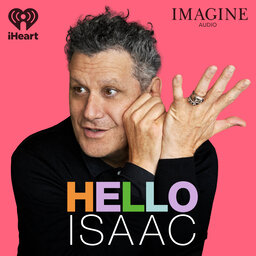Ample Hills Creamery Co-Founders, Jackie Cuscuna & Brian Smith
Isaac Mizrahi sits down with Ample Hills Creamery co-founders and co-owners, Jackie Cuscuna and Brian Smith, to discuss his favorite topic… ice cream. They chat about how their ice cream company shot to success with fans like Oprah and Steven Spielberg, how they lost everything, what it’s like running a business together as a married couple and more.
Follow Hello Isaac on @helloisaacpodcast on Instagram and TikTok, Isaac @imisaacmizrahi on Instagram and TikTok and Jackie, Brian and Ample Hills Creamery on Instagram @amplehills.
(Recorded on September 12, 2023)
 Hello Isaac with Isaac Mizrahi
Hello Isaac with Isaac Mizrahi


